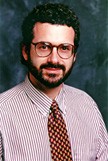MIT's Neil Gershenfeld to speak on 'Things That Think' Oct. 20
By Bill Steele
How about shoes that extract information from the carpet, or clothing that reminds you of appointments? Cuff links that actually link to something and bring back data? Glasses that actually see?
Such things might be in our future, according to Neil Gershenfeld, director of the Physics and Media Group of Massachusetts Institute of Technology Media Lab and co-director of the Things That Think research consortium, who believes the world has become cluttered with useless objects that need to be made smarter.
Gershenfeld will speak on "Things That Think" at noon Friday, Oct 20, in Room G10 of the Biotechnology Building at Cornell University. The event' which is free and open to the public, is the first in a new distinguished lecturer series sponsored by the Cornell Faculty of Computing and Information (FCI). A reception will follow at 1 p.m.
Author of the best-selling books "When Things Start To Think," "The Nature of Mathematical Modeling" and "The Physics of Information Technology," Gershenfeld has a B.A. in Physics (with high honors) from Swarthmore College, and a Ph.D. from Cornell in applied physics (1990); was a junior fellow of the Harvard University Society of Fellows; and is a member of the research staff at Bell Labs.
The MIT Media Lab investigates the relationship between the content of information and its physical representation, from developing molecular computers (which led to the first experimental demonstration of quantum computation) to smart furniture (seen in the Museum of Modern Art and used in automobile safety systems) to virtuosic musical instruments (including a cello for Yo-Yo Ma and a stage for the Flying Karamazov Brothers). Gershenfeld's vision is expressed on the Things That Think web site in this way: "We have arrived at a pivotal time in the evolution of information technologies. Today's collection of hardware and software is just capable enough to be able to bother people everywhere without necessarily helping them anywhere. We live in a world cluttered with buttons, batteries, wires and user IDs that are simultaneously demanding and helpless. The solution to this problem is that more is less: more capable devices, more pervasively embedded into the environment, linked more widely into robust distributed networks can finally become less obtrusive. Technology cannot truly be helpful unless it can provide the information that you need where you want it, when you want it and without you needing to manage it."
FCI was established at Cornell in May as an incubator for new interdisciplinary academic and research programs in computing and information science. It was formed by six members the Department of Computer Science and 12 members of other university units.
The FCI lecture series will bring to campus outstanding speakers who represent various aspects of computing and information science. Next month the FCI is co-sponsoring, with the Department of Molecular Biology and Genetics, the E.F. Racker Lecture in Biology and Medicine. In the spring, the FCI expects to present W.A. Wulf, president of the National Academy of Engineers.
Media Contact
Get Cornell news delivered right to your inbox.
Subscribe